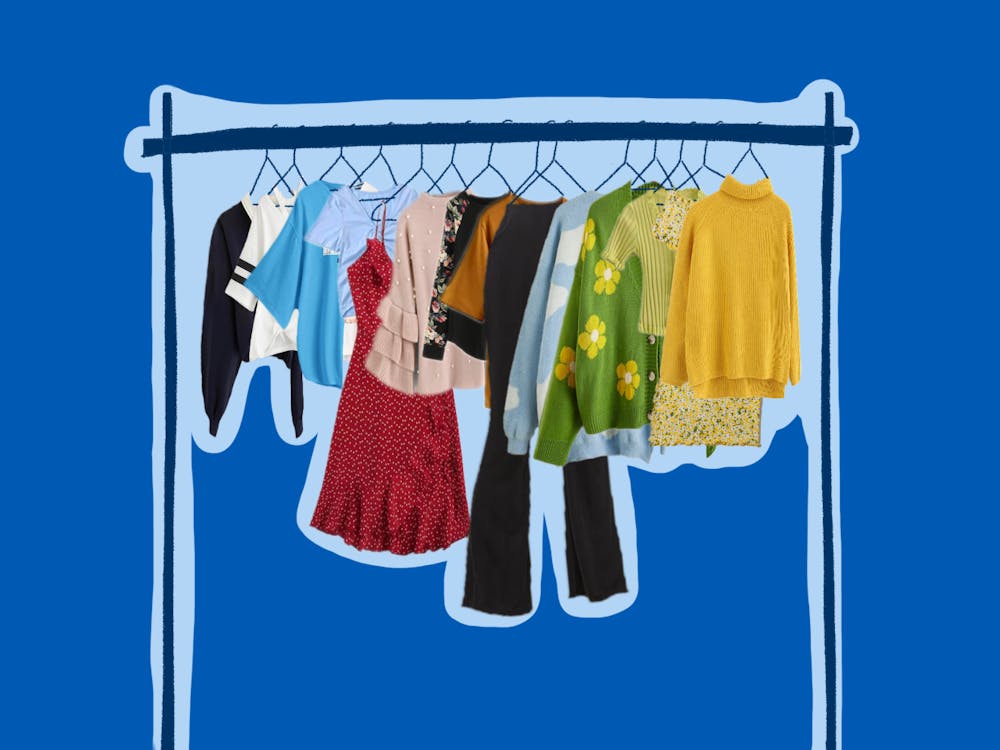
You know that brand? You know— the one that got into controversies over antisemitic and racist products, their use of child labor, their massively detrimental environmental impact, their general religious insensitivity and their repeated use of illegal reproductions of artists’ works for their products? Oh, wait: that doesn’t narrow it down.
Fast fashion, as defined by sustainable brand rating system Good for You, is “cheap, trendy clothing that samples ideas from the catwalk or celebrity culture and turns them into garments in high street stores at breakneck speed to meet consumer demand.” It is driven by consumers yet ultimately rooted in a capitalist system that sees growth as the complete indicator for development. Corporations know that the best way to continue growing is through the production of cheap products, despite their destructive impact on the environment and the labor force.
How did we get to a point where clothing stores could produce massive quantities of new arrivals every week, if not every day? And why do Duke students — who claim to be pro-environment and anti-racist — buy into it?
Fast fashion reached its peak in the 1990’s with the introduction of online shopping.
In the 1990’s, the introduction of online shopping brought forth the beginning of the fast fashion industry. Since then, more and more fast fashion brands — from Princess Polly to NastyGal to Zara to Shein — have emerged. Nowadays, 36 million packages in the United States alone are delivered every day, and the rate seems to be only increasing.
Is this growth model sustainable? Ask any environmentalist, and they would say no. As a study at Princeton indicated: “The fashion industry is currently responsible for more annual carbon emissions than all international flights and maritime shipping combined.” 20% of wastewater worldwide is just from the fashion industry. Synthetic fibers, like polyester or nylon, make up 35% of the microplastics in the ocean.
Why do we consume it then? At Duke, for instance, you can see fast fashion everywhere you turn. Tops from Forever 21, pants from Shein, dresses from H&M, skirts from Zara, jackets from Amazon, accessories from Uniqlo — at a university where 69% of students come from families at the top 20% of incomes and students claim to be environmentally conscious, why do cheap, unethically made clothing items have such a strong presence among our student body?
There is something neurologically pleasing to fast fashion. Shopping has become compulsive. In fact, a research team from Stanford, Carnegie Mellon, and MIT found that “when they showed one of the study’s subjects a desirable object for sale, the pleasure center, or nucleus ambens, in the subject’s brain lit up. The more the person wanted the item, the more activity the fMRI detected.” As Marc Bain from the Atlantic wrote, it is “consumerism as entertainment.”
So, can we blame it all on our brains? Not necessarily. More and more slow fashion movements and influencers have popped up around the world, calling for a massive reduction in the consumption of products. Its purpose: awareness.
As research chair at Parsons, Hazel Clark, claimed, “‘It’s about the consumer becoming aware of the whole process -- from designing through production through use and through the potential reuse.’”
In spite of this, many slow fashion brands like Christy Dawn, Reformation, Tradlands, and MATE the label have remained widely inaccessible. The prices are too high for the average American, and many of the brands lack diverse representation.
How can you still support aspects of the slow fashion movement without breaking the bank? Start with accessing your consumption habits. How often are you bringing in new clothes? Where do you primarily shop from? Learn about the labor practices of the companies you support. Not to mention, thrifting is always an option that can easily fit into budgets.
Get The Dirt
Subscribe to our weekly email about what's trending at Duke
Consumption should not be taken lightly. We do not have an indefinite amount of materials to continue producing and consuming at the rate that we do. Something has to change.
"consumption" - Google News
September 20, 2021 at 11:00AM
https://ift.tt/3lHiaqg
SHEIN is She-Out: It's time to question our consumption - Duke Chronicle
"consumption" - Google News
https://ift.tt/2WkKCBC
https://ift.tt/2YCP29R
Bagikan Berita Ini














0 Response to "SHEIN is She-Out: It's time to question our consumption - Duke Chronicle"
Post a Comment